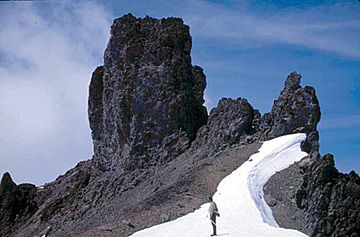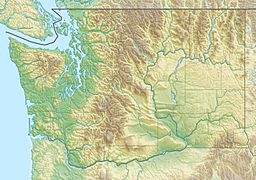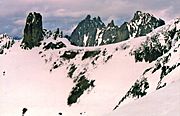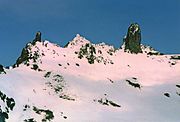Gilhooley Tower facts for kids
Quick facts for kids Gilhooley Tower |
|
|---|---|

Gilhooley Tower
|
|
| Highest point | |
| Elevation | 7,480 ft (2,280 m) |
| Prominence | 120 ft (37 m) |
| Geography | |
| Location | Jefferson County, Washington, US |
| Parent range | Olympic Mountains |
| Topo map | USGS Mount Deception |
| Geology | |
| Age of rock | Eocene |
| Type of rock | basalt |
| Climbing | |
| First ascent | 1963 by Donald Anderson, Harold Pinsch, Joyce Pinsch |
| Easiest route | Climbing class 4 |
Gilhooley Tower is a cool, tall rock formation called a basalt spire. You can find it in the amazing Olympic Mountains in Jefferson County, Washington state. This unique tower stands proudly inside Olympic National Park, which is part of the beautiful Olympic Peninsula. The closest taller mountain to Gilhooley Tower is Mount Deception, just a short distance away to the southeast. Water from rain and snow on Gilhooley Tower flows into smaller streams that feed into the Dungeness River and Dosewallips River.
Contents
Understanding the Climate Around Gilhooley Tower
Gilhooley Tower is located in a special weather area called the marine west coast climate zone. This zone is found in western North America, right by the ocean. It means the area gets a lot of rain and mild temperatures.
How Weather Forms Near the Olympics
Most of the weather systems, called weather fronts, start far out in the Pacific Ocean. They travel northeast, heading straight for the Olympic Mountains. When these fronts hit the tall peaks of the Olympic Range, they are forced to rise up into the sky. As the air goes higher, it cools down. This cooling causes the moisture in the air to turn into rain or snow. This process is known as Orographic lift.
Rain and Snow in the Mountains
Because of this "orographic lift," the Olympic Mountains get a lot of rain and snow. Winter months are especially snowy. It's usually cloudy during winter. However, in the summer, big areas of high pressure form over the Pacific Ocean. These high-pressure systems often bring clear skies and sunshine to the area.
Snow Conditions and Safety
Since the weather is influenced by the ocean, the snow that falls tends to be wet and heavy. This type of snow can increase the risk of avalanches. An avalanche is a fast-moving slide of snow down a mountain. It's important for climbers and hikers to be aware of these dangers.
Images for kids
-
Gilhooley Tower at the far left, with Mount Johnson in the middle, and Martin Peak to the right.
 | Kyle Baker |
 | Joseph Yoakum |
 | Laura Wheeler Waring |
 | Henry Ossawa Tanner |





